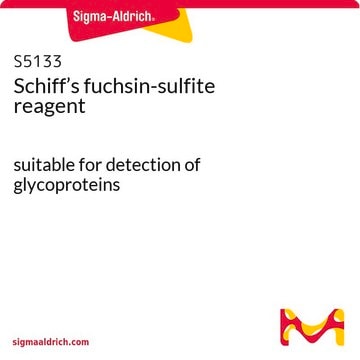Recommended Products
Quality Level
form
liquid
IVD
for in vitro diagnostic use
pH
2.1-2.5 (25 °C in H2O)
density
1.01 g/cm3 at 20 °C
application(s)
clinical testing
diagnostic assay manufacturing
hematology
histology
storage temp.
15-25°C
Related Categories
General description
Application
Storage Class Code
12 - Non Combustible Liquids
WGK
WGK 1
Flash Point(F)
Not applicable
Flash Point(C)
Not applicable
Certificates of Analysis (COA)
Search for Certificates of Analysis (COA) by entering the products Lot/Batch Number. Lot and Batch Numbers can be found on a product’s label following the words ‘Lot’ or ‘Batch’.
Already Own This Product?
Find documentation for the products that you have recently purchased in the Document Library.
Articles
Fungal stains remain an important tool in the histology laboratory's diagnostic arsenal for identifying infectious microorganisms.
Fungal stains remain an important tool in the histology laboratory's diagnostic arsenal for identifying infectious microorganisms.
Fungal stains remain an important tool in the histology laboratory's diagnostic arsenal for identifying infectious microorganisms.
Fungal stains remain an important tool in the histology laboratory's diagnostic arsenal for identifying infectious microorganisms.
Related Content
Learn about the criticality of biological tissue staining for research and clinical pathology using standard and special stains and dyes.
Learn about the criticality of biological tissue staining for research and clinical pathology using standard and special stains and dyes.
Learn about the criticality of biological tissue staining for research and clinical pathology using standard and special stains and dyes.
Learn about the criticality of biological tissue staining for research and clinical pathology using standard and special stains and dyes.
Our team of scientists has experience in all areas of research including Life Science, Material Science, Chemical Synthesis, Chromatography, Analytical and many others.
Contact Technical Service





